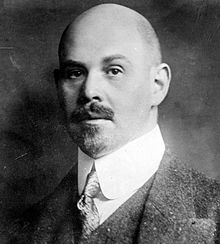
Back Walther Rathenau ALS والثير راثيناو ARZ والتر راتناو AZB Валтер Ратенау Bulgarian Walther Rathenau Catalan Walther Rathenau Czech Walther Rathenau Danish Walther Rathenau German Walther Rathenau Esperanto Walther Rathenau Spanish
Walther Rathenau | |
|---|---|
 | |
| Foreign Minister of Germany | |
| In office 1 February – 24 June 1922 | |
| President | Friedrich Ebert |
| Chancellor | Joseph Wirth |
| Preceded by | Joseph Wirth (acting) |
| Succeeded by | Joseph Wirth (acting) |
| Personal details | |
| Born | 29 September 1867 Berlin, North German Confederation |
| Died | 24 June 1922 (aged 54) Berlin, Weimar Republic |
| Political party | German Democratic Party |
| Relations | Emil Rathenau (father) |
| Profession | Industrialist, politician, writer |
| Part of a series on |
| Liberalism |
|---|
 |
Walther Rathenau (German: [ˈvaltɐ ˈʁaːtənaʊ]; 29 September 1867 – 24 June 1922) was a German industrialist, writer and politician who served as foreign minister of Germany from February to June 1922.
Rathenau was one of Germany's leading industrialists in the late German Empire. During World War I, he played a key role in the organisation of the German war economy and headed the War Raw Materials Department from August 1914 to March 1915.
After the war, Rathenau was an influential figure in the politics of the Weimar Republic. In 1921 he was appointed minister of reconstruction and a year later became foreign minister. Rathenau negotiated the 1922 Treaty of Rapallo, which normalised relations and strengthened economic ties between Germany and Soviet Russia. The agreement, along with Rathenau's insistence that Germany fulfil its obligations under the Treaty of Versailles, led right-wing nationalist groups (including a nascent Nazi Party) to brand him part of a Jewish-communist conspiracy.[1]
Two months after the signing of the treaty, Rathenau was assassinated by members of the ultra-nationalist Organisation Consul in Berlin. His death was followed by national mourning as well as widespread demonstrations against counter-revolutionary terrorism, which briefly strengthened the Weimar Republic. Rathenau came to be viewed as a democratic martyr during the Weimar era.[2] After the Nazis came to power in 1933, all commemorations of Rathenau were banned.
- ^ "The Idea of Europe". The Last Europeans. Retrieved 8 June 2024.
- ^ Sabrow 1996, pp. 336–337.
© MMXXIII Rich X Search. We shall prevail. All rights reserved. Rich X Search